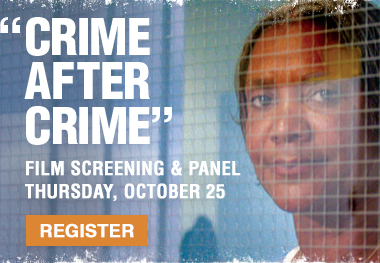Domestic violence and the justice system are the focus of “Crime After Crime,” a documentary that follows one survivor’s story.
 Six months. That’s how long pro bono attorney Joshua Safran thought it would take to free Deborah Peagler from prison. That’s how long filmmaker Yoav Potash thought he would spend documenting Deborah’s story.
Six months. That’s how long pro bono attorney Joshua Safran thought it would take to free Deborah Peagler from prison. That’s how long filmmaker Yoav Potash thought he would spend documenting Deborah’s story.
Despite a then-newly-adopted California state law that was supposed to protect survivors like Deborah caught up in the intersection of domestic violence and the justice system, Deborah’s case dragged out for years in court.
Joshua and his legal partner Nadia Costa were practicing land use law when they took on the fight to exonerate and free Deborah. They were able to revisit her case thanks to the California law that gives inmates the chance to present domestic violence evidence relevant to their cases, if it had been previously unheard. As attorneys, Joshua and Nadia were familiar with the criminal court system, but they had never had a client in prison, nor had they handled a case involving domestic abuse.
What all of them came to understand about the troubling intersection of domestic violence and the justice system is that survivors often become entangled in that system because of the abuse they experience and the lack of protection legal systems provide.
Deborah was physically abused for years and forced into prostitution by her abusive partner. When she discovered he was also sexually abusing her then six-year-old daughter, she and her child fled. Deborah’s abuser, along with a group of armed men then came after her. Although her ex was arrested, he was quickly released by police.
Realizing that leaving her abuser would not ensure her own safety or her child’s, Deborah asked two young men in her community for help. After the men took matters into their own hands and killed her abuser, Deborah was prosecuted for murder alongside them. She was sentenced to life in prison. The abuse that she and her daughter experienced was not included as evidence in court.
“There are Deborahs all over the country,” Yoav said. “And, most of them don’t even have a real sliver of hope to present the evidence that could free them from prison.”
Today, the type of law that allowed Deborah’s case to be re-opened exists only in California and — thanks to advocacy efforts sparked by the film — Illinois. Since documenting Deborah’s story, Yoav has been working with other state legislators, including in Washington state, to advocate for similar laws.
The state legislative process is neither easy nor fast. “Like making the film itself, it is a long, slow uphill battle,” Yoav said. “A strong intention in your heart is a requirement from the beginning because you will need to fall back on that in the face of times you would otherwise feel like quitting.”
And, as he and Joshua are now keenly aware, the battle continues — as it did with Deborah — even after laws change.
Joshua had to change his own perspective to maintain the fortitude not only to serve his client but also to challenge a systemic problem. For Joshua, the perseverance he needed came from a Hebrew word. As an Orthodox Jew, Joshua found himself considering the word avodah. Avodah, the word for prayer or spiritual work, is the same as the word used for labor.
“We don’t look at our prayers and ask, ‘When can I stop praying, because all my prayers will have come true?’ That’s not the Jewish way,” Joshua said. “We pray because we believe the prayer itself, the act of praying, has intrinsic value.
“It is the act of getting up every day and doing something for this cause, that’s our avodah.”
Join JFS and Joshua Safran for a screening and panel discussion Thursday, October 25.
 By Rachel Anne Seymour, Marketing & Communications Manager
By Rachel Anne Seymour, Marketing & Communications Manager



